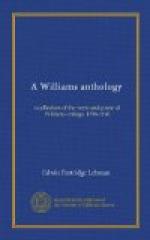What spell hath bound ye now? what lethargy
O’ercomes your ancient power? that
undisturbed
Ye slumber on, as if ye heeded not
The piercing shriek from yonder fuming
car,
Which saith that even here presumptuous
man
Has dared intrude upon the green domain,
Which ye inherited when Time was born.
Awake! arise! are ye forever dumb?
Let Greylock, most majestic of your band,
Stand up and shout aloud to Audubon,
Until from peak to peak the sound rolls
round,
Until yon mountain that o’erlooks
the west
Takes up the cry, of vengeance upon him
Whose strange devices break your long
repose.
In vain! ye are indeed forever dumb,
Obedient to the will of Destiny,
Who sits enthroned among the stars of
heaven,
And unto man’s inquiring vision
points
Toward the westering sun forevermore.
Such is the law that rules the universe;—
Planets and systems, e’en the sun
himself,
Around one common point progressive move.
And thus a few millenniums more shall
man
Proclaim the march of mind, and when ye
pass
Into oblivion with your weight of years,
When galaxies and suns are quenched in
gloom,
Th’ unshackled soul of man, itself
a star
Lit by the smile of God, shall wing through
space,
The destined heir to immortality.
Quarterly, 1859.
THE YELLOW JASMINE
FRANKLIN CARTER ’62
Ye golden bells, that toss your heaven-born
fragrance
On air around,
And know to make the most harmonious music
Without a sound!
Ye fragile flowers, whose delicate, dear
tendrils
Upward do climb,
Reveal to us the sweet, mysterious secret
Of love sublime!
Entwining with your gentle cunning fingers
The ragged tree,
Ye leave behind ye crowns and chaplets
wondrous,
Of jewelry!
Not pearls nor diamonds of a radiance
peerless,
Not amethyst.
When softly swaying on the human bosom,
Or flexile wrist,
Can add to life and beauty lustrous splendor,
With grace divine,
As when ye wreathe on gnarled oak and
holly
Your trailing vine!
Oh, love of God! in gracious ways unnumbered,
With gentlest touch,
Thou teachest men and pitifully showest
Of patience much!
We pray, dear Father, teach thine erring
children
This lesson meet—
To climb through fragile, earth born,
human tendrils
To life complete.
Quarterly, 1871.
AFTER DINNER SPEECHES
FRANKLIN CARTER ’62
According to common opinion Americans are the nation most addicted to speechmaking. Laboulaye makes a good point by representing the son of a leading character in “Paris in America” discovered by his father before a large audience, in the full tide of political speech, and maintaining afterwards to the old gentleman that it is the common practice among all the boys to make a speech on every possible occasion, that they may thus fit themselves for public life.




